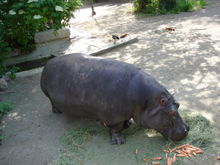бегемот
Belarusian
[edit]Etymology
[edit]From German Behemoth, from Hebrew בְּהֵמוֹת (behemót).
Pronunciation
[edit]Noun
[edit]бегемо́т • (bjehjemót) m animal (genitive бегемо́та, nominative plural бегемо́ты, genitive plural бегемо́таў)
- hippopotamus
- Synonym: гіпапата́м (hipapatám)
- (mythology) behemoth
Declension
[edit]| singular | plural | |
|---|---|---|
| nominative | бегемо́т bjehjemót |
бегемо́ты bjehjemóty |
| genitive | бегемо́та bjehjemóta |
бегемо́таў bjehjemótaŭ |
| dative | бегемо́ту bjehjemótu |
бегемо́там bjehjemótam |
| accusative | бегемо́та bjehjemóta |
бегемо́таў bjehjemótaŭ |
| instrumental | бегемо́там bjehjemótam |
бегемо́тамі bjehjemótami |
| locative | бегемо́це bjehjemócje |
бегемо́тах bjehjemótax |
| count form | — | бегемо́ты1 bjehjemóty1 |
1Used with the numbers 2, 3, 4 and higher numbers after 20 ending in 2, 3, and 4.
References
[edit]- “бегемот” in Belarusian–Russian dictionaries and Belarusian dictionaries at slounik.org
Bulgarian
[edit]Etymology
[edit]Borrowed from Russian бегемо́т (begemót).
Pronunciation
[edit]Noun
[edit]бегемо́т • (begemót) m
- (dated) hippopotamus
- Synonym: хипопота́м (hipopotám)
- (mythology) behemoth
Declension
[edit]| singular | plural | |
|---|---|---|
| indefinite | бегемо́т begemót |
бегемо́ти begemóti |
| definite (subject form) |
бегемо́тът begemótǎt |
бегемо́тите begemótite |
| definite (object form) |
бегемо́та begemóta | |
| count form | — | бегемо́та begemóta |
| vocative form | бегемо́те begemóte |
бегемо́ти begemóti |
References
[edit]- “бегемот”, in Речник на българския език [Dictionary of the Bulgarian Language] (in Bulgarian), Sofia: Bulgarian Academy of Sciences, 2014
- “бегемот”, in Речник на българския език [Dictionary of the Bulgarian Language] (in Bulgarian), Chitanka, 2010
Kazakh
[edit]| Alternative scripts | |
|---|---|
| Arabic | بەگەموت |
| Cyrillic | бегемот |
| Latin | begemot |
| Yañalif | ʙegemot |
Etymology
[edit]From Russian бегемо́т (begemót), from German Behemoth, from Hebrew בְּהֵמוֹת (behemót).
Pronunciation
[edit]Noun
[edit]бегемот • (begemot)
Synonyms
[edit]- сусиыр (susiyr)
Russian
[edit]Alternative forms
[edit]- бегемо́тъ (begemót) — Pre-reform orthography (1918)
Etymology
[edit]From German Behemoth, from Hebrew בְּהֵמוֹת (behemót).
Pronunciation
[edit]Noun
[edit]бегемо́т • (begemót) m anim (genitive бегемо́та, nominative plural бегемо́ты, genitive plural бегемо́тов, feminine бегемо́тиха, relational adjective бегемо́товый, diminutive бегемо́тик)
- hippopotamus
- Synonym: гиппопота́м (gippopotám)
- (mythology) behemoth
Declension
[edit]| singular | plural | |
|---|---|---|
| nominative | бегемо́т begemót |
бегемо́ты begemóty |
| genitive | бегемо́та begemóta |
бегемо́тов begemótov |
| dative | бегемо́ту begemótu |
бегемо́там begemótam |
| accusative | бегемо́та begemóta |
бегемо́тов begemótov |
| instrumental | бегемо́том begemótom |
бегемо́тами begemótami |
| prepositional | бегемо́те begemóte |
бегемо́тах begemótax |
Descendants
[edit]- → Armenian: բեգեմոտ (begemot)
- → Bulgarian: бегемо́т (begemót)
- → Georgian: ბეჰემოთი (behemoti)
- → Ingrian: begemootta
- → Kazakh: бегемот (begemot)
- → Kyrgyz: бегемот (begemot)
- → Turkmen: begemot
- → Uyghur: بېگېموت (bëgëmot)
- → Uzbek: begemot
Ukrainian
[edit]
Etymology
[edit]From German Behemoth, from Hebrew בְּהֵמוֹת (behemót).
Pronunciation
[edit]Noun
[edit]бегемо́т • (behemót) m animal (genitive бегемо́та, nominative plural бегемо́ти, genitive plural бегемо́тів, relational adjective бегемо́товий)
- hippopotamus
- Synonym: гіпопота́м (hipopotám)
- (mythology) behemoth
Declension
[edit]| singular | plural | |
|---|---|---|
| nominative | бегемо́т behemót |
бегемо́ти behemóty |
| genitive | бегемо́та behemóta |
бегемо́тів behemótiv |
| dative | бегемо́тові, бегемо́ту behemótovi, behemótu |
бегемо́там behemótam |
| accusative | бегемо́та behemóta |
бегемо́ти, бегемо́тів behemóty, behemótiv |
| instrumental | бегемо́том behemótom |
бегемо́тами behemótamy |
| locative | бегемо́тові, бегемо́ті behemótovi, behemóti |
бегемо́тах behemótax |
| vocative | бегемо́те behemóte |
бегемо́ти behemóty |
References
[edit]- Bilodid, I. K., editor (1970–1980), “бегемот”, in Словник української мови: в 11 т. [Dictionary of the Ukrainian Language: in 11 vols] (in Ukrainian), Kyiv: Naukova Dumka
- “бегемот”, in Горох – Словозміна [Horokh – Inflection] (in Ukrainian)
- Belarusian terms derived from German
- Belarusian terms derived from Hebrew
- Belarusian terms with IPA pronunciation
- Belarusian terms with audio pronunciation
- Belarusian lemmas
- Belarusian nouns
- Belarusian masculine nouns
- Belarusian animal nouns
- be:Mythology
- Belarusian hard masculine-form nouns
- Belarusian hard masculine-form accent-a nouns
- Belarusian nouns with accent pattern a
- be:Even-toed ungulates
- Bulgarian terms borrowed from Russian
- Bulgarian terms derived from Russian
- Bulgarian terms with IPA pronunciation
- Bulgarian terms with audio pronunciation
- Bulgarian lemmas
- Bulgarian nouns
- Bulgarian masculine nouns
- Bulgarian dated terms
- bg:Mythology
- bg:Even-toed ungulates
- Kazakh terms borrowed from Russian
- Kazakh terms derived from Russian
- Kazakh terms derived from German
- Kazakh terms derived from Hebrew
- Kazakh terms with IPA pronunciation
- Kazakh lemmas
- Kazakh nouns
- kk:Mythology
- kk:Even-toed ungulates
- Russian terms derived from German
- Russian terms derived from Hebrew
- Russian 3-syllable words
- Russian terms with IPA pronunciation
- Russian terms with audio pronunciation
- Russian lemmas
- Russian nouns
- Russian masculine nouns
- Russian animate nouns
- ru:Mythology
- Russian hard-stem masculine-form nouns
- Russian hard-stem masculine-form accent-a nouns
- Russian nouns with accent pattern a
- ru:Even-toed ungulates
- Ukrainian terms derived from German
- Ukrainian terms derived from Hebrew
- Ukrainian terms with IPA pronunciation
- Ukrainian terms with audio pronunciation
- Ukrainian lemmas
- Ukrainian nouns
- Ukrainian masculine nouns
- Ukrainian animal nouns
- uk:Mythology
- Ukrainian hard masculine-form nouns
- Ukrainian hard masculine-form accent-a nouns
- Ukrainian nouns with accent pattern a
- uk:Even-toed ungulates
